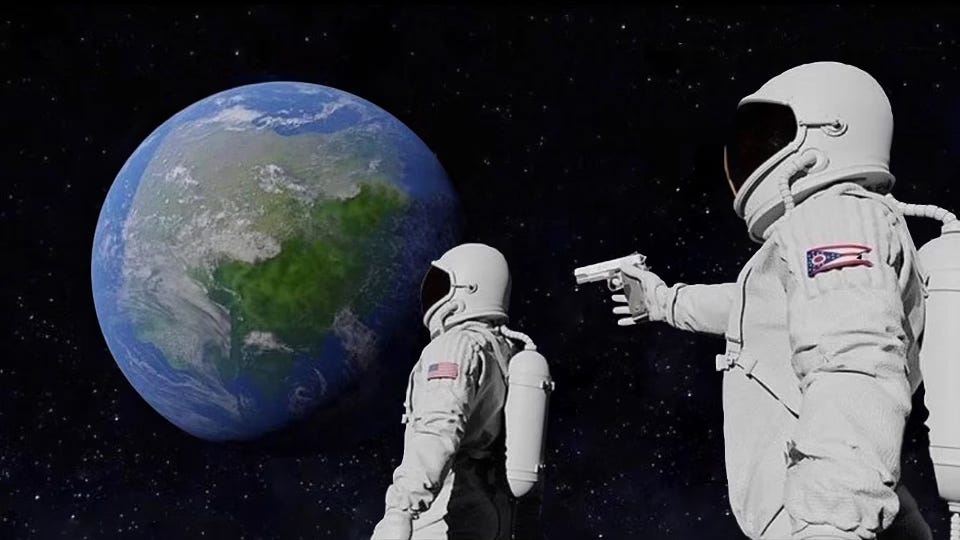How Cooked Are We?
Depends on us, I guess.
Here’s a video I made on Google in about three minutes:
Google’s Veo AI can make you a video out of words. Put in a good text prompt and it will create an entire scene out of nothing, complete with dialogue. Some of them are astonishing. Many of the viral clips that demonstrate this end with a message from the computer-generated onscreen character: “we’re cooked.”
This slogan of the AI age means, I guess, that soon it will be very difficult to tell fact from fiction, image from reality. I can only respond with the astronaut meme: always has been.
Or at least, it has been for most of human history, excepting perhaps the period of a few centuries into which we were born and which may now be coming to an end. The hard distinction between documentary and artistic images must surely be an artefact of the photographic age, when technology arrived that could capture light and transmit it, undoctored, to viewers.
It could do that. Of course the photograph was still a representation of something, and like any representation it could be more or less true to the original. It could be cleverly altered, selectively framed, even faked.
It was always a bit of a conceit that the camera opened up a direct window into the moment it recorded, so that a picture in a newspaper or a video clip on T.V. automatically confirmed the truth of what it documented. In reality we still relied on editors and journalists to be trustworthy and use their powers of selection honestly, just as older generations relied on portrait painters to capture a good likeness. We relied, in other words, not just on accurate recording technology but on faithful transmission by people using the technology.
What changed is our awareness of that fact. Under the influence of a general assumption that automated things are more objective, we comfortably forgot that human intervention and therefore human choice were still involved in every act of communication.
Then the internet reminded us. That was the significance of those videos during COVID that showed government officials putting on masks backstage, walking to a podium, then taking them off again. Cameras everywhere made it harder to leave out inconvenient viewpoints.
Now you can spin up an alternate reality out of whole cloth and make it look plausibly like it was caught on film. One possible consequence is that people will mistake AI confections for documentary evidence. A slightly less grim one, though, is that they’ll remember how much the meaning of an image depends on who made it, for what purpose, and how.
If AI deepfakes put us in danger, maybe that’s because in the fallout of the scientific revolution we fell victim to the delusion that machines can amass raw truth without relying on any human agency. The opposite is true: only human agency guarantees, or vitiates, the truth of a document. We have always been at one another’s mercy in this regard.
In ancient ecphrasis—poetry about works of art—there’s a common conceit that really good art is so realistic it could almost come to life. The sculptor Myron made a cow so anatomically exact that poets said, “I think it’s about to moo!” A really good sculpture could even seem empsuchos, alive. The ultimate expression of this idea is Ovid’s story of Pygmalion, a man who sculpted a woman so beautiful he fell in love with her. “That’s how much his art is hidden by his art,” wrote Ovid.
But of course, the whole point of this trope is that it takes the context of the work for granted. The fantasy of living sculpture is entrancing because we know it’s imaginary; the lifelike cow is amazing because we know how someone must have labored over it. There is no such thing as an image, not even a digital one, without a maker and a history. It was always a pipe dream that we could understand the world without factoring in the people behind the pictures.
The problem isn’t that we can fake things better. The problem is that we don’t trust one another not to fake things. That is not a problem our computers created. It’s not one they can fix, either. Machines can’t cook us. If we are cooked, it’s on us.




Not trying to be cute, but, what is truth? Seems I've read that somewhere.
And so the intentional fallacy rears its head.